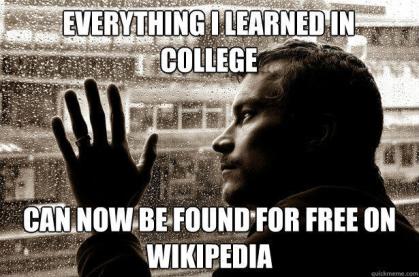
Wikipedia is certainly a valuable resource, a reservoir of accurate, sophisticated information–revolutionary in almost every way. Wikipedia includes information going far beyond a “regular” encyclopedia. It includes information about important academic articles and thinkers, too, for example. Wikipedia is the world’s largest and most accurate encyclopeida in the history of the world.
However, in contrast to the meme above, Wikipedia does not including everything you learned in college. Notions that suggest Wikipedia is a comprehensive catalog of everything available in college misunderstand the true purposes of learning and how it happens, as well as a typical person’s motivation.
The college / university campus is a unique place in any society. While formal education is not a prerequisite for being very knowledge, institutions of higher education have no parallel in our world.
An important part of learning in college includes practicing said information — asking questions, writing essays, taking tests, doing practice problems, and being “evaluated.” Another important part of learning in college including listening to experts and being around them. Likewise, learning in college is social, too – meeting very different peoples and participating in various student activities.
Wikipedia includes knowledge–the same way articles and books do. All of these can be read, but it takes a dedicated person and/or a dedicated environment to actually learn.
So the meme above could just as easily say, “everything I learned in college can be found in the books I (should have) read.”
 On a similar note, it is common to see someone post on Facebook that they attended the “University of Hard Knocks” (or something similar). These people don’t understand that college is much more than “life experience.” It’s a place that teaches a very specific kind of knowledge and allows for a kind of thinking, sadly, not taught or welcomed in general society. It includes learning inside and outside of the classroom. “Life experience” is always important. One form of “life experience” is the college experience, but life experience alone does not add up to a “college education.”
On a similar note, it is common to see someone post on Facebook that they attended the “University of Hard Knocks” (or something similar). These people don’t understand that college is much more than “life experience.” It’s a place that teaches a very specific kind of knowledge and allows for a kind of thinking, sadly, not taught or welcomed in general society. It includes learning inside and outside of the classroom. “Life experience” is always important. One form of “life experience” is the college experience, but life experience alone does not add up to a “college education.”
Of course, as I’ve said here and elsewhere, a college education is not a prerequisite for being very knowledge.
What do you think?
Dr. Andrew Joseph Pegoda
